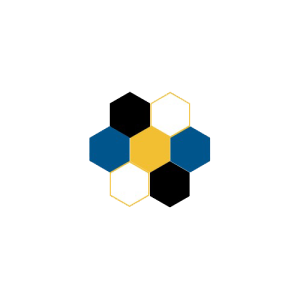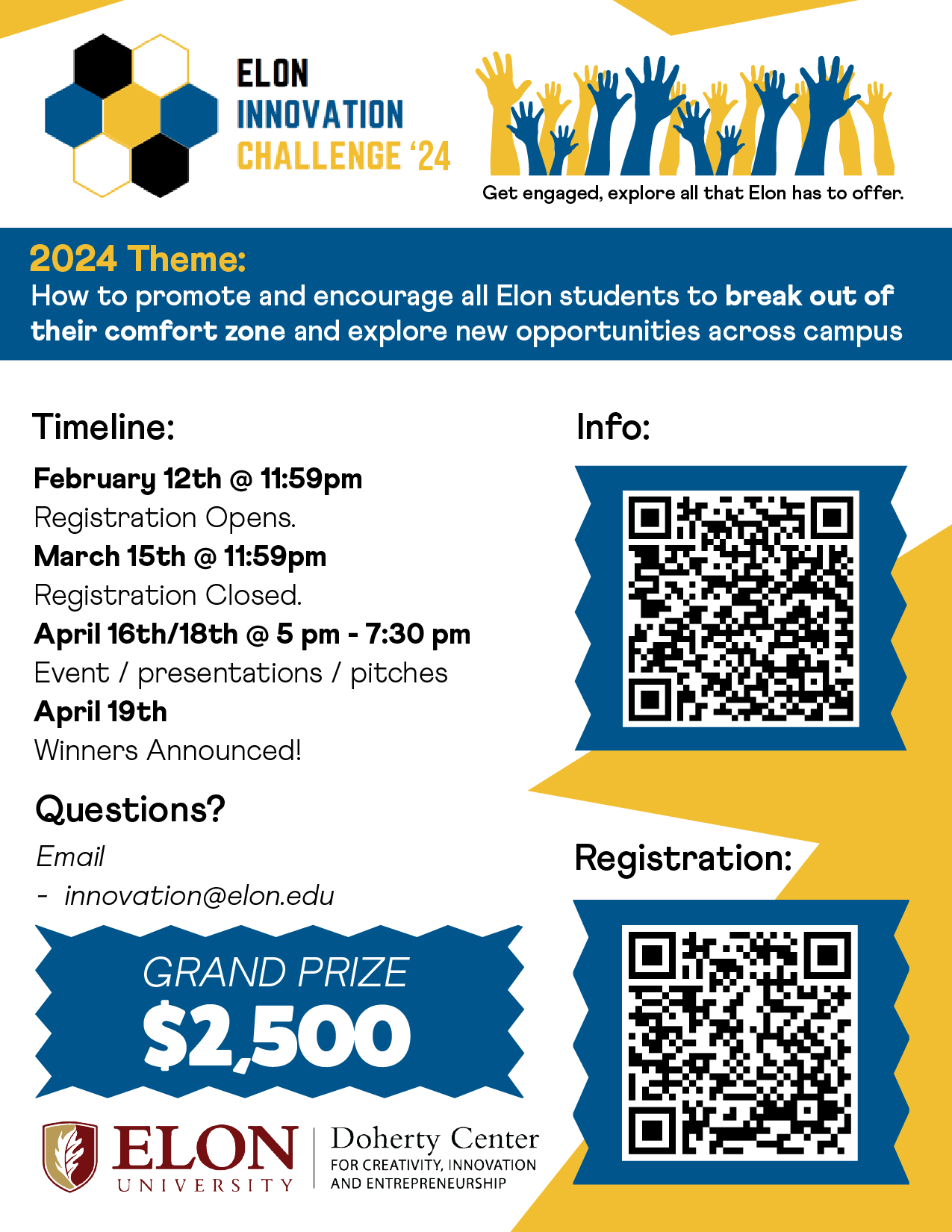- Home
- Academics
- Business
- Doherty Center
- Elon Innovation Challenge
Elon Innovation Challenge
The 2024 Elon Innovation Challenge invites you to weave connections across Elon’s academic landscape. Our mission is to foster meaningful engagement among students from all six schools, unlocking the power of cross-disciplinary collaboration. We recognize the vast array of events and organizations currently enriching the student experience, yet believe there’s a unique opportunity to bridge these offerings, maximizing engagement and fostering a united campus spirit.
Do you have a brilliant idea to spark dialogue and collaboration between students in different disciplines? The Innovation Challenge seeks innovative and creative solutions that connect our six schools. Imagine bridging the gap between business and engineering, or merging the perspectives of arts and sciences. Whether you envision new events, collaborative projects, or technology-driven solutions, bring your vision to life. Join us from February to mid-April for workshops, mentorship, and the chance to pitch your transformative idea in April. Be part of the movement to elevate Elon’s student experience and earn incredible prizes along the way.
Prizes
Grand Prize: $2,500
Second Place: $500
Third Place: $250
Fourth Place: $100
 Challenge Process
Challenge Process
The competition will evaluate the uniqueness of the solution, its prototype, and the pitch. The pitches should demonstrate the feasibility of the solution as well as its ability to gain traction at Elon, serve as a model for other universities and sustain its momentum.
The competition is open for applications beginning on February 12. All teams participating in the Elon Innovation Challenge should submit an initial registration form (deadline for registration is March 15), meet with your assigned mentor by March 30, create a prototype of the solution, and pitch their venture to a panel of judges from April 16-18.
Eligibility, Venture Criteria & Judging Criteria
Eligibility
- Teams can be composed of one individual or groups of up to three. We encourage groups to include students from other majors or schools at Elon.
- The applicants are responsible for ensuring the product, service, app or campaign does not infringe on existing copyright or patents
- The applicants are responsible for ensuring the product or service abides by any and all applicable regulatory or certification requirements and is suitable to be sold in North Carolina and the United States
Solution Criteria
- Solution can be a product, service, app or campaign
- Each solution must include a prototype, or MVP (Minimum Viable Product). Teams are encouraged to utilize the Maker Hub in creating their prototypes although they are not required to do so.
- Solutions can be for profit or designed as a social enterprise
- Teams must agree to a brief check-in with an individual from Elon’s Doherty Center for Creativity, Innovation & Entrepreneurship by March 27. Teams should contact Kim Phipps (kphipps3@elon.edu), Alyssa Martina (amartina@elon.edu), or Lars Heidenreich (lheidenreich@elon.edu) to schedule the check-in meeting.
- Teams will be able to work or meet with an EIC coach if desired.
Judging Criteria
Solution (10 points)
- What is it?
- What/how is it used for and what benefits does it provide?
- How will the actual solution differ from the prototype?
- Discuss the feasibility of the solution (demonstrate how the solution is capable of being executed, launched or able to grow/scale)?
- What impact will the solution have?
Market (10 points)
- Who will use or buy your solution? Who is the primary customer/user of the solution? Why is it a good fit?
- Why is it/would it be desirable to the customer?
- What makes your solution unique and different from similar ones/ competitors in the market?
- How can the solution be marketed?
Details (10 points)
- What is the expected cost of your solution?
- Are there any legal or licensing requirements necessary for your solution? Have these requirements been met?
- How well designed Is your prototype? How close does it represent the actual solution?
- How strong is the pitch? Does it cover all the bases above? Does the team seem serious about the solution?
General (20 points)
- Why is your solution unique and special (e.g., innovative and sustainable) and why should we be excited about it? (Show how excited you are and sell it to us!)
Contact
Please contact the Doherty Center for Creativity, Innovation & Entrepreneurship at 336-278-5916 or Kim Phipps at kphipps3@elon.edu if you have questions.
EIC Committee
Professional Co-Chairs:
- Professor Karl Sienerth, Department of Chemistry in Elon College, the College of Arts and Sciences
- Emily Krechel, Director of New Student Programs
Student Co-Chairs:
- Lars Heidenreich ’24
- Michael Ginitrini ’26
- Owen McBryan ’26
Committee Members: Kyle Altmann, Richard Blackmon, Nyote Calixte, Marcus Elliott, John Flynn, Stephen Folger, Dave Gammon, Betty Garrison, David Higham, Lauren Hill, David Jiang, Martin Kamela, Robin Kazmarek, Elena Kennedy, Derek Lackaff, Scott Leighty, Alyssa Martina, Ryan Mattfeld, David McGraw, Sean McMahon, Scott Morrison, Khairi Morrow, Scott Oakes, Kim Phipps, Daniel Reis, John Ring, Evan Small, Scott Spurlock, Bill Squadron, Jonathan Su, Scott Wolter

